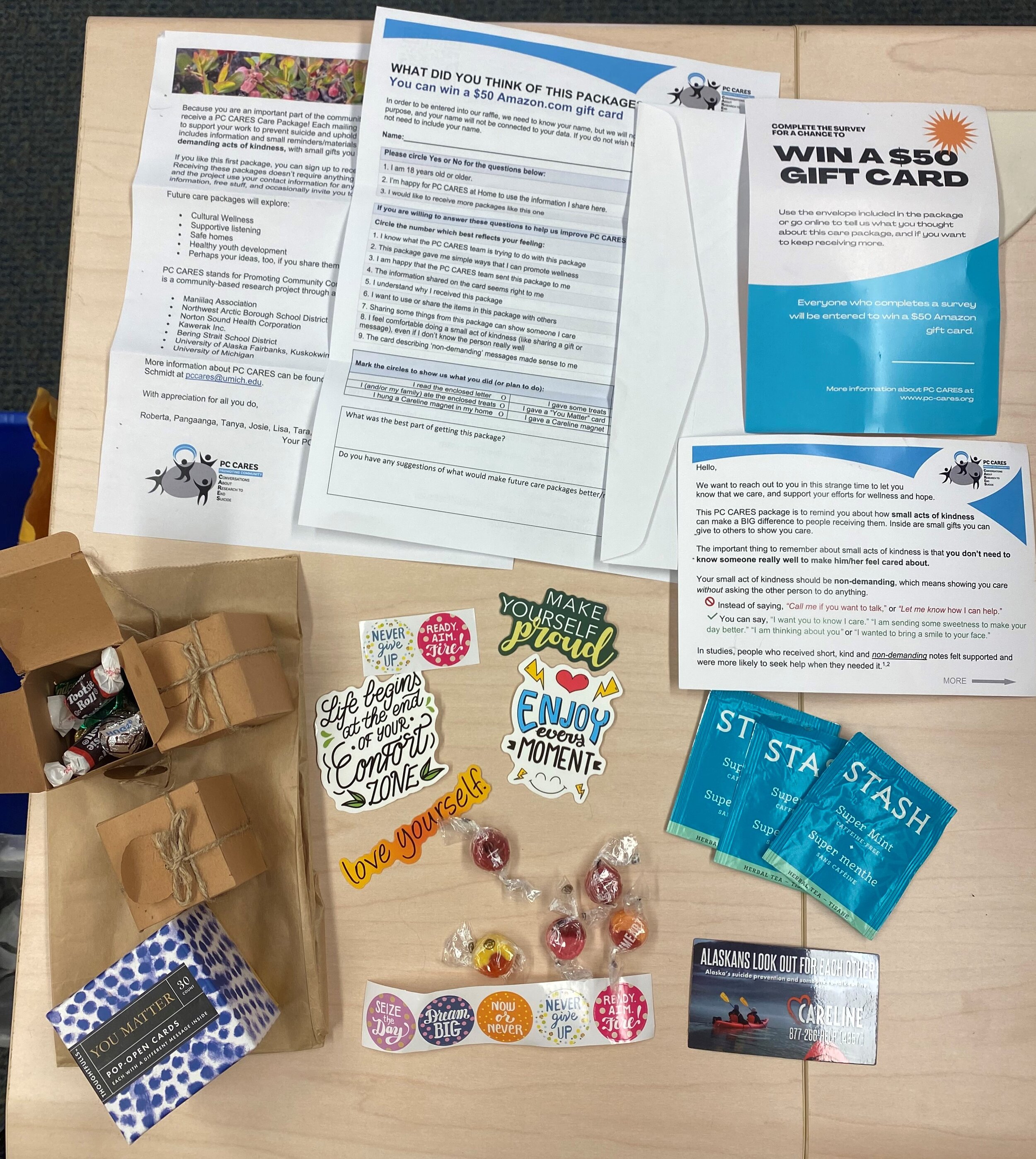
Small acts of kindness
With this PC CARES package, we want to give you a chance to use what we have learned about how small acts of kindness can make a BIG difference to people who receive them. In this PC CARES Package are small gifts you can give to others to show you care.
You don’t need to be close to someone to make him/her feel cared about. In studies, people who received short, kind and non-demanding notes felt supported and were more likely to seek help when they needed it.
Your small act of kindness should be non-demanding, which means showing you care without asking the other person to do anything.
Instead of saying, “Call me if you want to talk,” or “Let me know how I can help.”
You can say, “I want you to know I care.” “I am sending some sweetness to make your day better.” “I am thinking about you” or “I wanted to bring a smile to your face.”

Talk with youth
This PC CARES package is a small reminder that spending time listening to youth can help them feel connected, cared for and supported.
Did you know that youth want more adults to talk with them?
Many adults think that young people just want to be left alone, but youth themselves say something different. Youth actually want adults to talk to them about their lives.
In a survey with 255 youth in Northwest Alaska, the most common ways young people said adults could prevent suicide is: “talk to us.” Youth who have caring adults they can talk to are less likely to experience suicide (both thoughts and attempts), substance use, and violence.
Adults in our region make a difference by connecting with the youth in their lives on a regular basis. In Bering Strait, about half of 182 youth surveyed said that they “talked to an adult about what is happening in their lives”. Of these, most said they talked to their parents.5 This also means that almost half of youth need a trusted adult to talk to. You can be that trusted adult.
You—as a parent, family member or friend—can make a difference by asking a young person about her or his life and being there to listen.
You can say, “Tell me about what is going on.” Then, just hear what they have to say. Listening well means showing acceptance, patience, and a willingness to let the young person share what he or she is going through without giving advice or opinions.
You don’t have to be an expert in their problem. You don’t have to think of all the “right things” to say. Just being kind and repeating back what you heard them say is enough. Most people benefit from sharing their feelings with someone who just listens, without scolding or judgement.
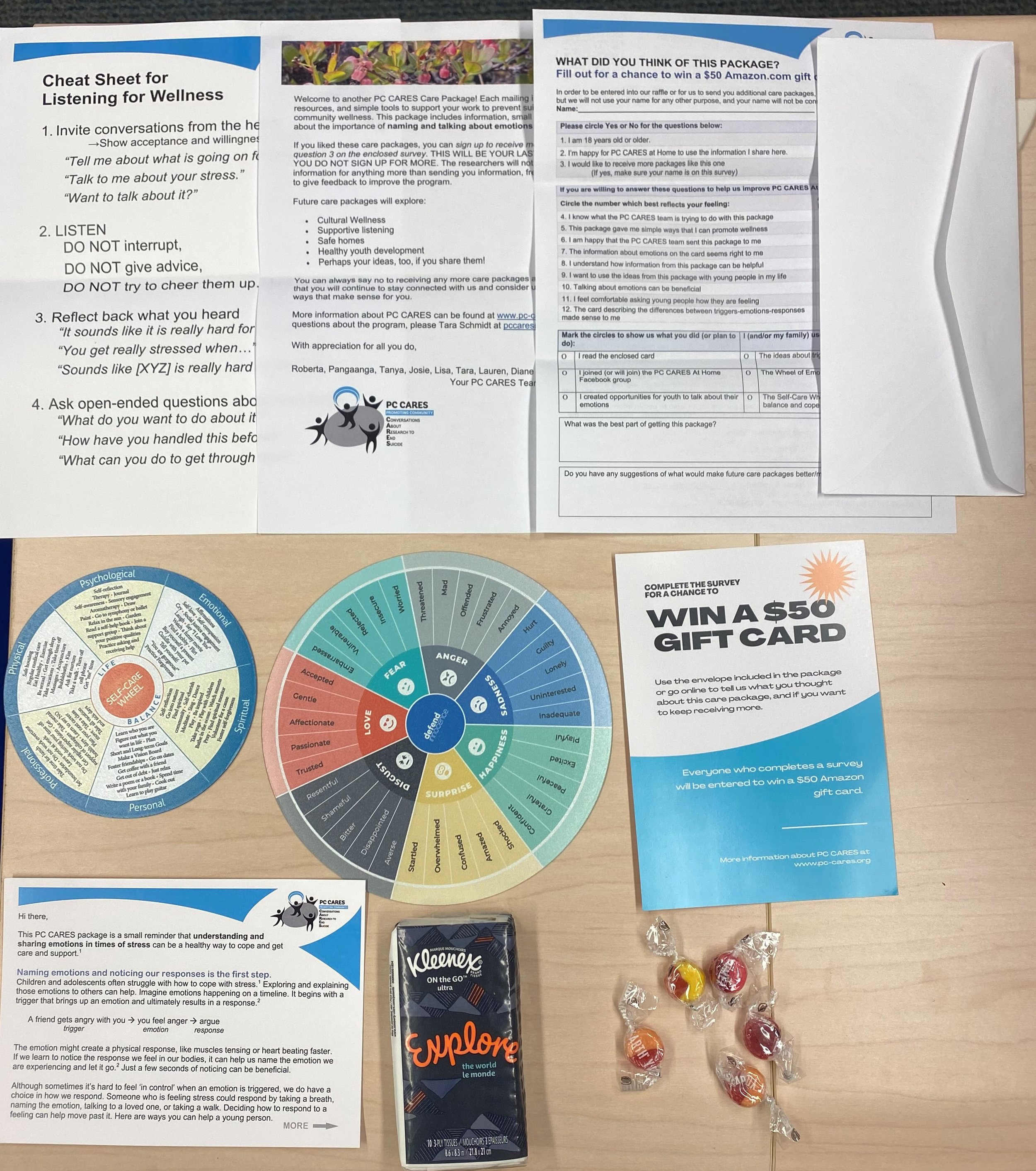
Listening Well
Understanding and sharing emotions in times of stress can be a healthy way to cope and get support.
Naming emotions and noticing our responses is the first step.
Children and adolescents often struggle with how to cope with stress. Exploring and explaining those emotions to others can help. Imagine emotions happening on a timeline. It begins with a trigger that brings up an emotion and ultimately results in a response.
A friend gets angry with you (trigger)… you feel anger (emotion)… you argue (response)
The emotion might create a physical response, like muscles tensing or heart beating faster. If we learn to notice the response we feel in our bodies, it can help us name the emotion we are experiencing and let it go.2 Just a few seconds of noticing can be beneficial.
Although sometimes it’s hard to feel ‘in control’ when an emotion is triggered, we do have a choice in how we respond. Someone who is feeling stress could respond by taking a breath, naming the emotion, talking to a loved one, or taking a walk. Deciding how to respond to a feeling can help move past it. Here are ways you can help a young person.
How can YOU support young people in your family and community?
1. Set aside time for talking and listening. Create opportunities to talk to and support children or youth in your life. Ask them regularly (daily, weekly) how they feel and what is going on. It’s OK if they don’t want to talk: keep asking.
2. Be open to all kinds of feelings, including anger, joy, frustration, fear and anxiety. Help youth develop a “feelings vocabulary” by talking about your own emotions (we have included a feelings wheel with some ideas).
3. Wait until you are calm and ready to hear about someone’s experiences before you invite a conversation, then practice listening for wellness.
4. Reassure the person that everyone feels mad, sad, jealous, bored etc. from time to time. Children should know that their feelings are not good or bad. Emotions happen, but how we react to them is a choice.
5. Sharing your feelings is good for people at any age, and it can show younger people how to do it. This kind of modeling can open lines of communication and care that can support your young person in the future.

The importance of restful sleep
A wise person once said, “The shortest distance between hope
and despair is a good night’s sleep.”
Getting restful sleep improves mood 😊 and helps a person stay in control of their actions. Good sleep makes learning, doing activities, and problem-solving more manageable. Sleep gives our bodies a chance to repair, replenish, and restart, and helps our brains 🧠 prepare for a new day. Young people and children especially need healthy sleep. Getting enough sleep, regularly and without interruption, is ideal. 🛌 We included a magnet that shows how much sleep is enough for different ages.
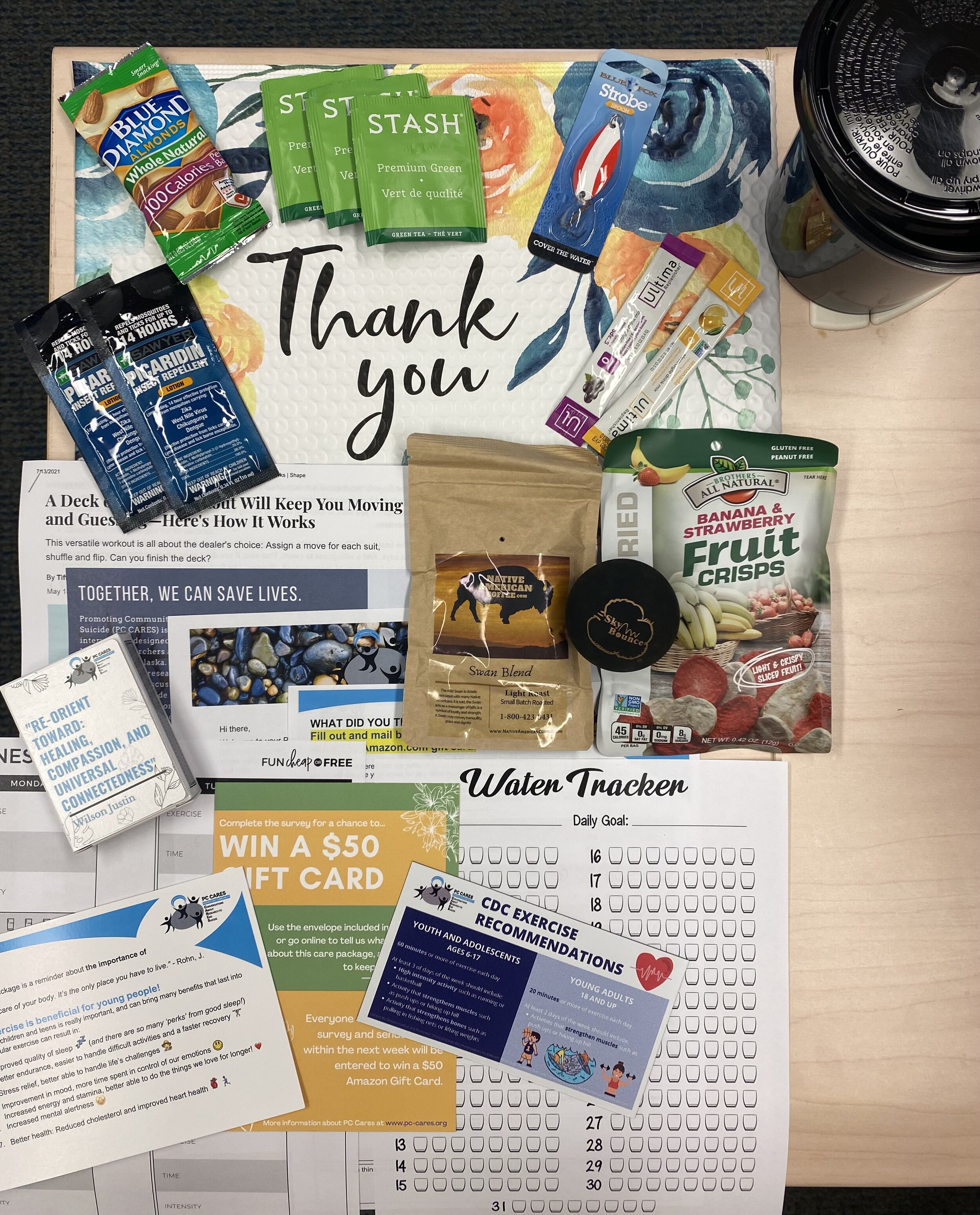
Healthy Living
This PC CARES package is a reminder about the importance of
exercise.
“Take care of your body. It’s the only place you have to live.” - Rohn, J.
Regular exercise is beneficial for young people!
Being active for children and teens is really important, and can bring many benefits that last into adulthood. Regular exercise can result in:
1. Improved quality of sleep (and there are so many ‘perks’ from good sleep!)
2. Better endurance, easier to handle difficult activities and a faster recovery
3. Stress relief, better able to handle life’s challenges
4. Improvement in mood, more time spent in control of our emotions
5. Increased energy and stamina, better able to do the things we love for longer!
6. Increased mental alertness
7. Better health: Reduced cholesterol and improved heart health
How much physical activity do youth and young adults need?
According to the CDC, 6-17 year olds should get 60+ minutes of exercise each day and try activities that strengthen muscles and bones. Young adults and adults ages 18+ should get at least 20 minutes of exercise each day. At least two of those days per week should focus on strengthening muscles.
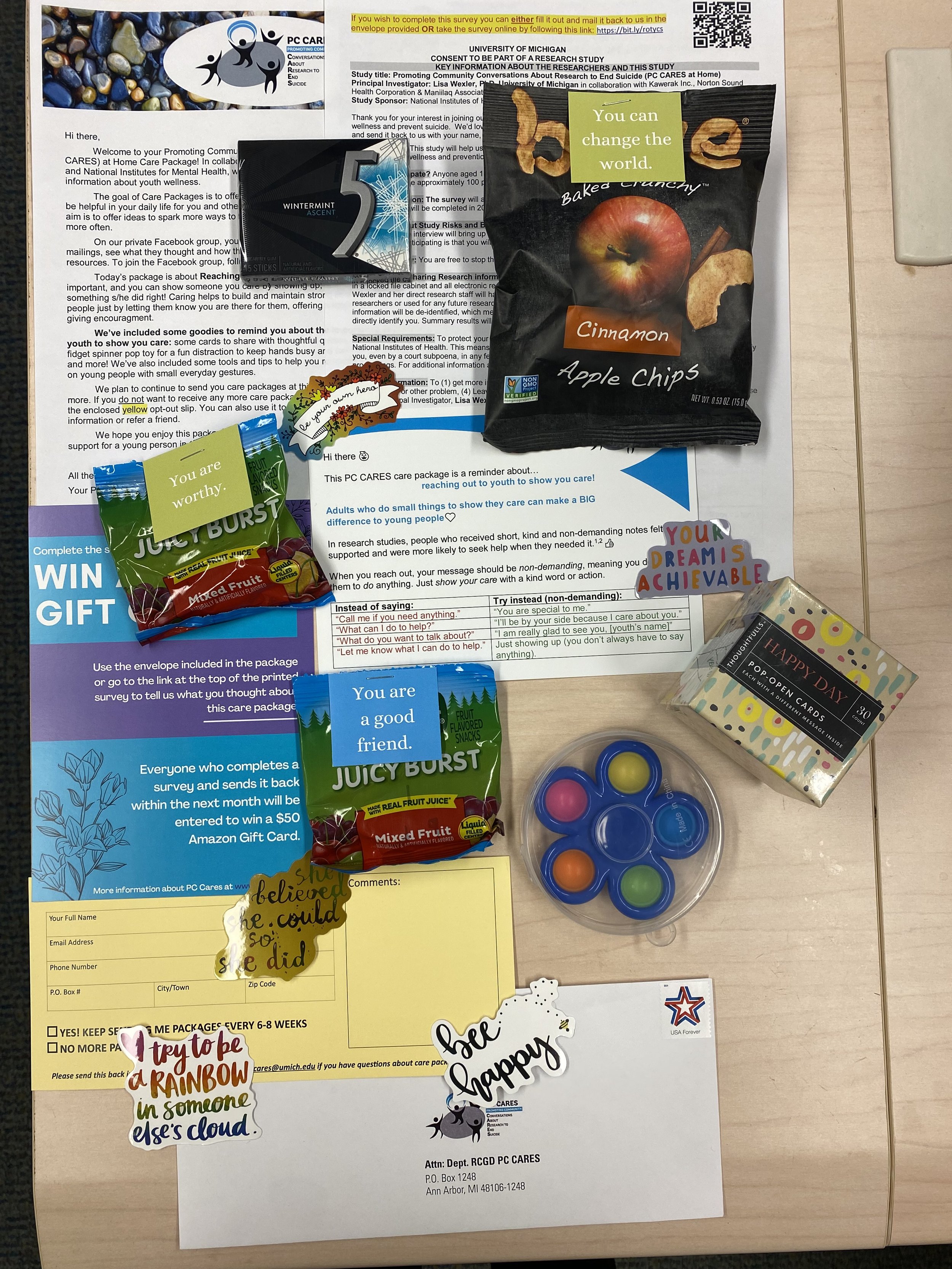
Reach out to youth
This PC CARES care package is a reminder about reaching out to youth to show you care!
Just the small act of supportive adults reaching out to show they care can make a big difference in the lives of young people❤.
When you reach out, your message should be non-demanding, meaning you show you are there for them without asking them to do anything.
Instead of saying, “Call me if you need anything.” Or “Let me know what I can do to help.”
Try saying, “I am here for you.” Or “I am thinking about you today.” Or “I just wanted to reach out to remind you that you’re important to me and I care about you.”
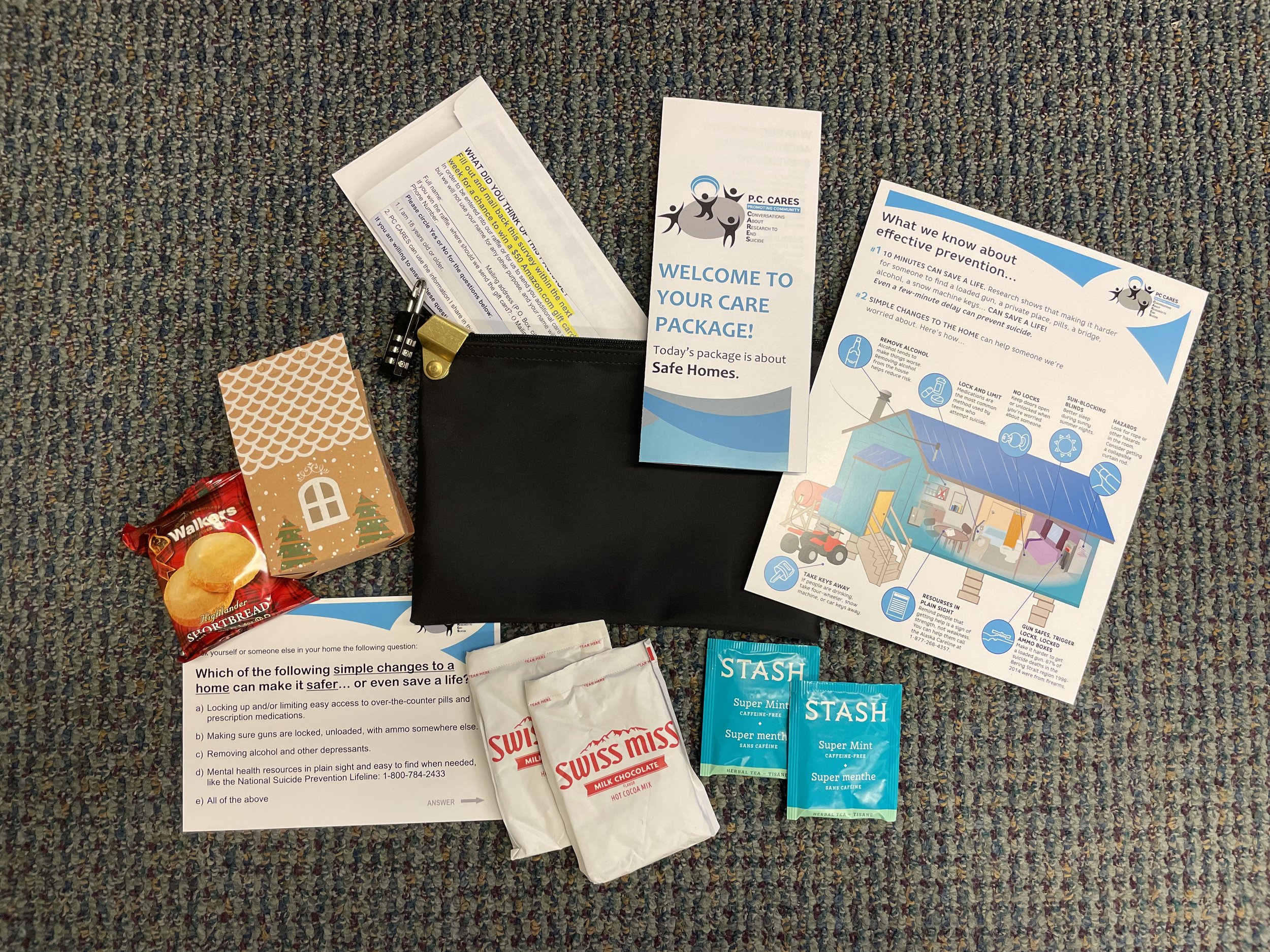
Safe Homes
This care package encourages recipients to ask themselves or someone else in their home the following question:
Which of the following simple changes to a
home can make it safer… or even save a life?
a) Locking up and/or limiting easy access to over-the-counter pills and prescription medications.
b) Making sure guns are locked, unloaded, with ammo somewhere else.
c) Removing alcohol and other depressants.
d) Mental health resources in plain sight and easy to find when needed. You can text: 4help to: 839 863 or call 877-266-4357
e) All of the above
As you may have guessed—the answer is e) All of the above.
- Pills are the most common way for teens to attempt suicide.
- Guns are the deadliest – not allowing for second thoughts.
- Alcohol is involved in about half of these terrible events, locally
Making homes safer means any and all of these actions.
Doing the above will give the person who is struggling more time and chances to turn away from suicide. While having safer homes isn’t a guarantee, we want to do everything we can to keep our loved ones safe. Making it 10 minutes harder to get a loaded gun can save a life.

Building Connections
This care package is about building caring connections with youth.
Did you know that caring connections between youth and adults, family members and other mentors can improve youth’s well-being and health? These positive relationships offer support, guidance, and also help young people make healthy decisions.
You can make a BIG difference by finding time to talk with (or just be) with a young person you care about. You can just join them where they are ‘at’, or start a conversation, such as: “What do you know about where your name came from?”
This package includes some things to help you:
• Build positive relationships with youth that help them feel important. Because…
Connection to non-parental, positive role models can improve the health and well-being of young people.
• Start conversations with youth about their family connections to others they care about.
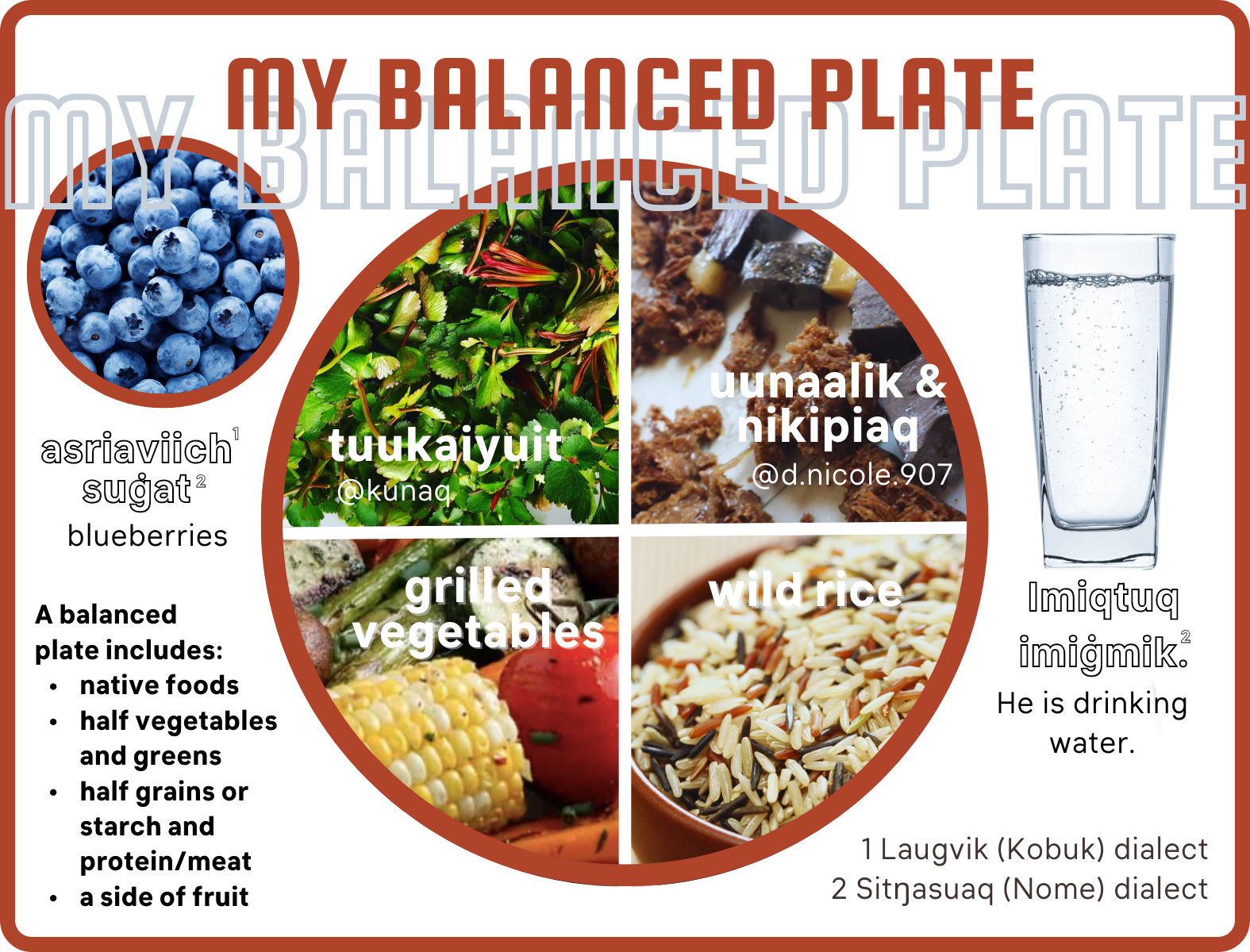
Finding Healthy Balence
WHAT DO WE KNOW ABOUT FINDING HEALTHY BALANCE?
There are all kinds of things in life that barely leave us time for practicing self-care. Thankfully, four major areas of wellness including mental, physical, emotional and spiritual are closely interconnected. One positive change in one area is helpful for other areas. Even just a little change can remind us of the beauty of life wellness and create a health balance of our lives.
What are some summer activities that help us find healthy balance?
Food from the land – We stay connected to the land when gathering and putting away food. The act of gathering and sharing what we make also connects us to each other. Food from the land is the healthiest available.
Connection to culture – Attending cultural festivals or even just spending time listening to Elders share their memories and stories keeps the Yup’it and Iñupiat people strong mentally, emotionally, and spiritually.
We’ve included some items to remind you about the importance of building connections with youth:
• Sunscreen, bug repellent and hygiene kit you can take with you out on the land
• Berry picking bucket
• Snacks that you can share with youth and people around you








